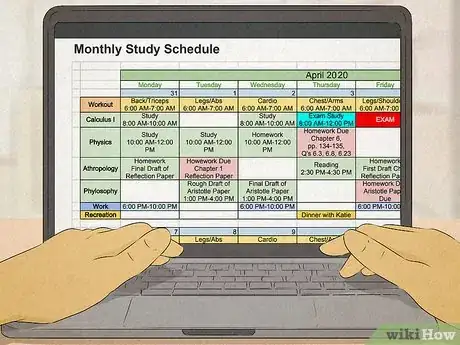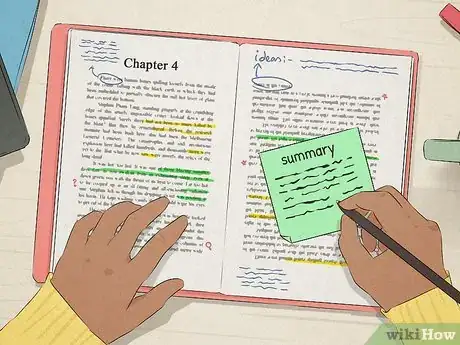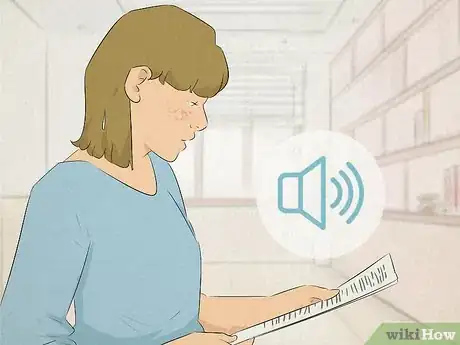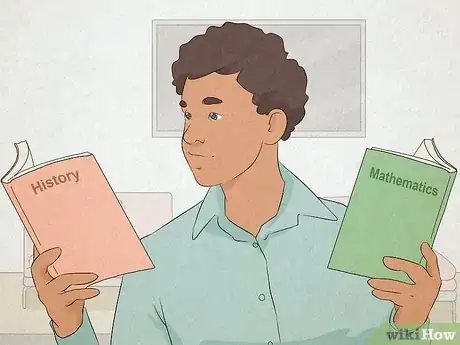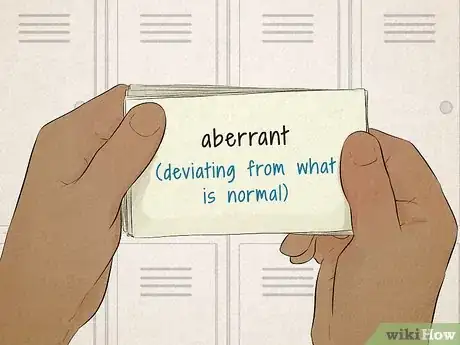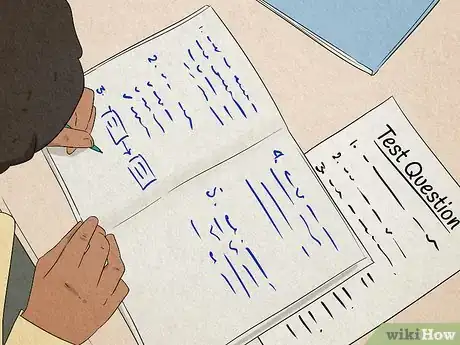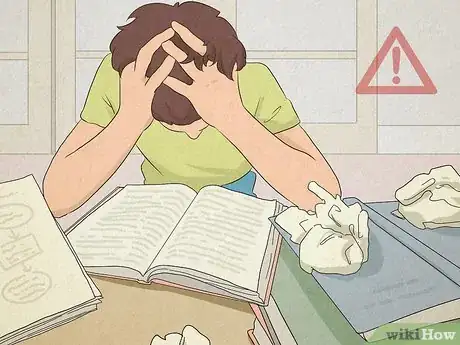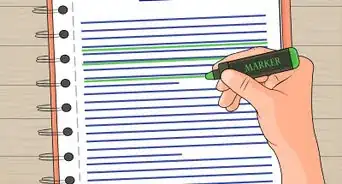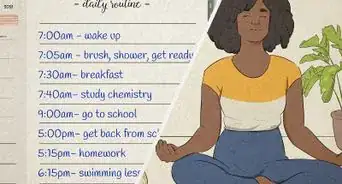This article was co-authored by Nathan Fox, JD and by wikiHow staff writer, Danielle Blinka, MA, MPA. Nathan Fox is an LSAT teacher, the co-host of the Thinking LSAT Podcast, and the co-founder of LSATdemon. Nathan is the author of six LSAT books including The Fox LSAT Logical Reasoning Encyclopedia. He scored a 179 on the February 2007 LSAT and holds a JD from the University of California, Hastings College of the Law.
There are 15 references cited in this article, which can be found at the bottom of the page.
wikiHow marks an article as reader-approved once it receives enough positive feedback. This article received 222 testimonials and 91% of readers who voted found it helpful, earning it our reader-approved status.
This article has been viewed 1,228,859 times.
Being good at studying is a skill that anyone can learn, and that includes you! There are good study habits and there are bad study habits, and this article is going to show you how to ditch what’s not working and focus on strategies that will work and make a difference come test day. When you’re finished, you’ll know how to study smarter, not harder. Plus, you’ll have a few tricks up your sleeve for when you need that extra boost of motivation!
Steps
Expert Q&A
Did you know you can get expert answers for this article?
Unlock expert answers by supporting wikiHow
-
QuestionHow can I improve my memory for studying?
 Nathan Fox, JDNathan Fox is an LSAT teacher, the co-host of the Thinking LSAT Podcast, and the co-founder of LSATdemon. Nathan is the author of six LSAT books including The Fox LSAT Logical Reasoning Encyclopedia. He scored a 179 on the February 2007 LSAT and holds a JD from the University of California, Hastings College of the Law.
Nathan Fox, JDNathan Fox is an LSAT teacher, the co-host of the Thinking LSAT Podcast, and the co-founder of LSATdemon. Nathan is the author of six LSAT books including The Fox LSAT Logical Reasoning Encyclopedia. He scored a 179 on the February 2007 LSAT and holds a JD from the University of California, Hastings College of the Law.
Academic Tutor Many exams are more about reading and logic than they are about memorization. In those cases, you really just need to take practice exams to get comfortable with the format. For other types of exams, the best thing to do is practice over and over so answering the questions almost becomes muscle memory.
Many exams are more about reading and logic than they are about memorization. In those cases, you really just need to take practice exams to get comfortable with the format. For other types of exams, the best thing to do is practice over and over so answering the questions almost becomes muscle memory. -
QuestionHow can I motivate myself to study?
 Nathan Fox, JDNathan Fox is an LSAT teacher, the co-host of the Thinking LSAT Podcast, and the co-founder of LSATdemon. Nathan is the author of six LSAT books including The Fox LSAT Logical Reasoning Encyclopedia. He scored a 179 on the February 2007 LSAT and holds a JD from the University of California, Hastings College of the Law.
Nathan Fox, JDNathan Fox is an LSAT teacher, the co-host of the Thinking LSAT Podcast, and the co-founder of LSATdemon. Nathan is the author of six LSAT books including The Fox LSAT Logical Reasoning Encyclopedia. He scored a 179 on the February 2007 LSAT and holds a JD from the University of California, Hastings College of the Law.
Academic Tutor
-
QuestionWhich is the best time to study?
 Nathan Fox, JDNathan Fox is an LSAT teacher, the co-host of the Thinking LSAT Podcast, and the co-founder of LSATdemon. Nathan is the author of six LSAT books including The Fox LSAT Logical Reasoning Encyclopedia. He scored a 179 on the February 2007 LSAT and holds a JD from the University of California, Hastings College of the Law.
Nathan Fox, JDNathan Fox is an LSAT teacher, the co-host of the Thinking LSAT Podcast, and the co-founder of LSATdemon. Nathan is the author of six LSAT books including The Fox LSAT Logical Reasoning Encyclopedia. He scored a 179 on the February 2007 LSAT and holds a JD from the University of California, Hastings College of the Law.
Academic Tutor Try to devote your best hour of the day to studying, whenever that is. It's different for everybody, but for most people, earlier in the day is better. For instance, you might need to set your alarm an hour earlier and study before work or school. However, you might also do well if you can block off an hour at lunch.
Try to devote your best hour of the day to studying, whenever that is. It's different for everybody, but for most people, earlier in the day is better. For instance, you might need to set your alarm an hour earlier and study before work or school. However, you might also do well if you can block off an hour at lunch.
References
- ↑ https://usq.pressbooks.pub/academicsuccess/chapter/study-space/
- ↑ https://kidshealth.org/en/kids/studying.html
- ↑ https://learningcenter.unc.edu/tips-and-tools/studying-101-study-smarter-not-harder/
- ↑ https://success.oregonstate.edu/learning/concentration
- ↑ https://asc.tamu.edu/Study-Learning-Handouts-(1)/Reviewing-Lecture-Notes
- ↑ https://asc.tamu.edu/Study-Learning-Handouts-(1)/Reviewing-Lecture-Notes
- ↑ https://algonquincollege.libguides.com/studyskills/reading-with-purpose
- ↑ https://ace.fsu.edu/sites/g/files/upcbnu296/files/Study_Strategies_by_Learning_Styles.pdf
- ↑ https://learningcenter.unc.edu/tips-and-tools/studying-101-study-smarter-not-harder/
- ↑ https://learningcenter.unc.edu/tips-and-tools/studying-101-study-smarter-not-harder/
- ↑ https://health.cornell.edu/about/news/study-breaks-stress-busters
- ↑ https://au.reachout.com/articles/foods-that-help-our-brain-study
- ↑ https://www.apa.org/gradpsych/2011/11/study-smart
- ↑ https://guides.centralpenn.edu/c.php?g=695569&p=4999857
- ↑ https://learningcenter.unc.edu/tips-and-tools/studying-101-study-smarter-not-harder/
- ↑ https://kidshealth.org/en/kids/studying.html
- ↑ https://www.cdc.gov/healthyschools/features/students-sleep.htm
- ↑ https://kidshealth.org/en/kids/studying.html
- ↑ https://www.apa.org/gradpsych/2011/11/study-smart
- ↑ https://www.ua.edu/news/2018/04/dont-cram-for-the-exam-9-ways-to-study-effectively-for-finals/
- ↑ https://learningcenter.unc.edu/tips-and-tools/studying-101-study-smarter-not-harder/
- ↑ https://www.psychologytoday.com/us/blog/the-athletes-way/201606/physical-activity-boosts-brain-power-and-cerebral-capacity
- ↑ https://science.ubc.ca/students/blog/study-groups
About This Article
To study well, find a quiet, bright place to study so you can focus without getting tired. Rewrite your notes as you review them so you remember the material better, and use flashcards to reinforce important information. At the end of each study session, test yourself by writing out sample questions or looking up questions online. Finally, if you can, set aside some time each day to study instead of cramming the night before your test. For more studying tips, like how to avoid getting distracted, keep reading!

